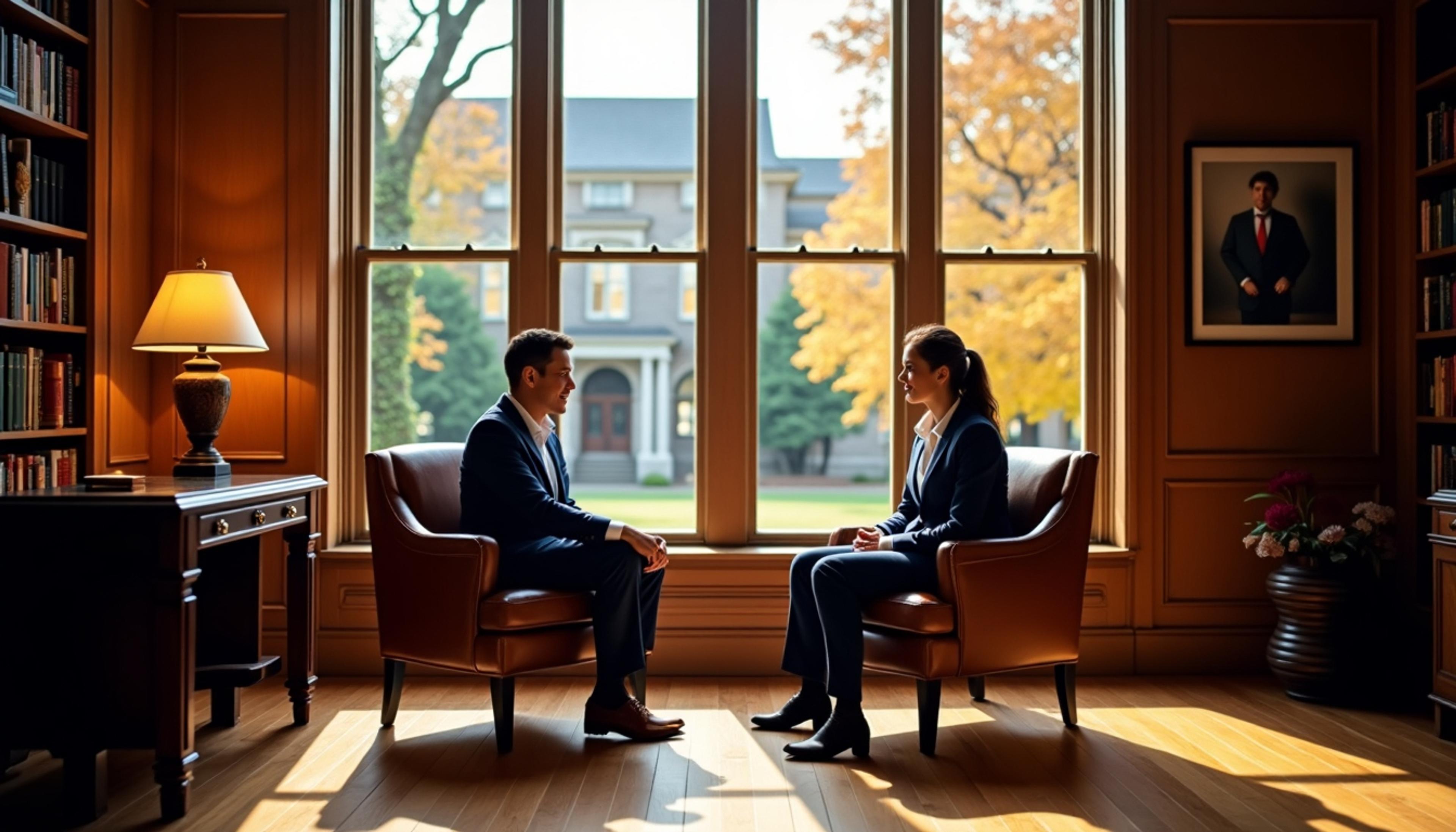Princeton Interview Guide – Questions & How to Prepare (2025)
The Princeton interview serves as a significant step in every student's application experience. Most applicants have questions about what to expect in their Princeton interview and how they can leave a lasting impression. This guide will help them make this interview their strongest asset.
Posted March 6, 2025

Table of Contents
Each year, Princeton University admits fewer than 4% of its applicants, making it one of the most selective institutions in the world. The Princeton interview offers candidates an opportunity to showcase their potential and connect meaningfully with a Princeton representative. With proper preparation, applicants can turn this meeting into a positive way to stand out in the admissions process.
This guide breaks down everything you need to know about Princeton interviews, including the Princeton interview and admission process, common interview questions, preparation tips, and strategies for success. With this information, applicants can confidently approach the interview process and make it their strength.
The Interview Process at Princeton University
A good grasp of Princeton's interview process helps applicants take on this chance with the right mindset. The interviews play a part in admissions decisions, yet they remain as a Princeton supplement rather than decisive elements in the final outcome.
Role of Interviews in Princeton Admissions
Princeton's interview works as a casual conversation that runs 30-45 minutes. Students can share their educational goals and get to know the university better during this time. The evaluation process marks interviews as "Considered," though they don't carry as much weight as core elements like GPA, essays, and test scores. A strong interview might help borderline cases, and a negative report could affect an application's chances.
Interview Timeline and Scheduling
The interview process has a clear timeline:
- Princeton starts interviews after getting the completed application
- Students get an email from the Princeton Alumni Schools Committee
- The 2022-23 cycle offers both virtual and in-person options
- Interview schedules vary, with some happening as late as February
Princeton's alumni network tries to reach most applicants, but interviews depend on alumni availability in the student's area. Note that missing an interview invitation won't affect an application. Alumni availability, not admission chances, determines who gets an interview.
Students can expect a flexible and accommodating process. Interviews usually run between 30 minutes to an hour. The format might change, but the main goal stays the same: creating meaningful conversations between applicants and Princeton's representatives.

Types of Interviews at Princeton
Princeton stands out among top universities thanks to its extensive alumni network that conducts interviews. The university runs one of higher education's largest volunteer interviewing programs with more than 7,000 alumni conducting interviews each year.
Princeton Alumni Interviews
The Princeton Alumni Schools Committee offers optional alumni interviews, coordinates them, and connects with 93-94% of applicants who want to participate. These relaxed conversations let candidates share their interests and dreams naturally. Students can meet their alumni interviewer at:
- Local coffee shops
- Public libraries
- Virtual platforms (Zoom/Video chat)
- High school meeting rooms
What makes these interviews special comes from graduate students who attended Princeton and share their real experiences of university life. The Princeton alumni interview aims to understand each applicant's character and potential rather than giving a formal evaluation.
Princeton Admissions Interview
Princeton takes a different approach from its peer institutions by not offering on-campus interviews with admissions officers. This strategy showcases the university's commitment to its alumni interview program and creates consistency in evaluating candidates. The admission office designed this system to give equal opportunities to all applicants, whatever their ability to visit campus.
Many selective universities have reduced or stopped their alumni interview programs. However, Princeton continues to maintain its reliable system. This choice shows how much the university values personal connections during admissions while keeping interviews optional and stress-free for applicants.

Important Pre-Interview Preparation Steps
Preparation is key to making a strong impression during the interview. Applicants should focus on three main areas: researching Princeton, crafting personal narratives, and developing a strategic approach to the interview.
Researching Princeton's Values and Culture
Good research is the foundation of interview preparation. Generic comments about Princeton's prestige or ranking won't help. Students should talk about specific aspects of Princeton's academic programs, research opportunities, and unique traditions. They should know which classes they want to take and which professors they're excited to learn from.
Preparing Your Personal Story and Achievements
A compelling personal story can affect the interview outcome by a lot. Students should tell their story like a mini-narrative around one or two main themes. Instead of listing achievements, they should focus on meaningful experiences and major events that show who they really are. This helps interviewers learn about the student's life direction.
Creating Your Interview Strategy
A well-prepared strategy includes practicing answers to common interview questions and preparing thoughtful questions for the interviewer. Business casual attire is recommended, and applicants should send a thank-you note afterward to reinforce key points from the conversation interview, a personal thank-you note shows appreciation and highlights key discussion points.
Common Princeton Interview Questions
Princeton interviewers ask questions to learn about a student's academic interests, personal story, and leadership abilities.
Academic Interest Questions
The vast majority of interviews start with questions about academic goals and future plans. Students often hear "What makes you want to study your stated major?" and "Why did you decide to apply to Princeton?". The best answers focus on specific elements of their chosen field that connect with Princeton's programs. Students should share their genuine enthusiasm without mentioning generic points about rankings or prestige.
Example Answer: “I plan to major in molecular biology because of its potential to revolutionize healthcare. My summer internship at a genetics lab solidified my interest, particularly in using CRISPR technology to treat inherited diseases. Princeton’s research opportunities in genomics excite me because they align perfectly with my goals.”
Personal Background Questions
These questions help reveal each candidate's story and character growth. Common examples include:
- “Tell me about your background”
Example Answer:
"I grew up in a small town where I was surrounded by a tight-knit community. My parents always emphasized the importance of education, and their encouragement helped me pursue opportunities beyond my hometown. For instance, in high school, I initiated a peer mentoring program to support underclassmen struggling with math and science. That experience not only strengthened my leadership skills but also inspired me to consider a career in education policy. I see Princeton’s focus on public service and interdisciplinary studies as a perfect match for my ambitions."
- “What are your favorite books/movies/TV shows and why?”
Example Answer:
"One of my favorite books is To Kill a Mockingbird by Harper Lee. I admire how it addresses complex social issues through the perspective of a child, which makes the story relatable and profound at the same time. It sparked my interest in justice and equality, leading me to join my school’s debate team, where I focused on topics like educational access and civil rights. At Princeton, I hope to delve deeper into these themes through courses in sociology and political science."
- “If you could meet one person, dead or alive, who would it be?”
Example Answer:
"I would love to meet Katherine Johnson, the NASA mathematician whose calculations were pivotal during the Space Race. Her story is inspiring not only because of her extraordinary talent but also because of the barriers she overcame as an African American woman in a male-dominated field. Her perseverance reminds me of the importance of resilience, which has motivated me during challenging times, like when I was the only girl on my school’s robotics team. Her legacy inspires me to pursue engineering and advocate for diversity in STEM fields."
Leadership and Extracurricular Questions
Princeton's evaluation process considers leadership potential as a vital component. The STAR approach (Situation, Task, Action, Result) helps students structure their leadership stories effectively. This format creates clear examples that showcase extracurricular abilities and a growth mindset.
Questions like these need answers that emphasize learning and resilience rather than just success stories:
- “Tell me about your extracurricular involvement.”Example Answer: "I’ve been deeply involved in my school’s environmental club, where I lead initiatives to reduce plastic waste. Last year, I organized a campaign to replace single-use plastic bottles in the cafeteria with refillable alternatives. The project involved negotiating with suppliers, rallying student volunteers, and presenting the plan to school administrators. We succeeded in cutting cafeteria waste by 40%. This experience taught me how collaboration and persistence can drive meaningful change."
- “Can you share a leadership experience?”Example Answer: "As captain of my high school’s basketball team, I led a group of 12 players during one of the most challenging seasons. Midway through the year, our coach resigned unexpectedly, leaving the team uncertain and unmotivated. I stepped up by organizing extra practices and maintaining team morale. Although we didn’t win the championship, our ability to stay united and improve our performance after such a setback was incredibly rewarding. This experience solidified my commitment to leading by example, a skill I plan to apply at Princeton."
- “Tell me about a time you failed.”Example Answer: "During my sophomore year, I launched a tutoring program to help struggling students prepare for standardized tests. I assumed everyone would share my enthusiasm, but initial participation was much lower than expected. After seeking feedback, I realized the issue was timing—sessions conflicted with extracurricular activities. I adjusted the schedule and partnered with teachers to promote the program, and attendance improved significantly. This failure taught me the importance of listening to others and being adaptable, qualities I continue to apply in leadership roles."
Success Strategies for The Interview Day
Princeton interviews offer unique challenges and opportunities to show your best self. Your success depends on how well you understand their interview format and stay composed during the conversation.
Virtual vs In-Person Interview Tips
Virtual interviews need a professional setup in a quiet, well-lit space with a neutral background. Technical preparation is significant - test your camera, microphone, and internet connection at least 30 minutes before the interview to avoid last-minute stress.
You should arrive 10-15 minutes early for in-person interviews. This gives you time to settle in and take in your surroundings. Remember to bring your portfolio or notebook with questions and relevant documents.
Professional Etiquette and Presentation
Your professional image goes beyond how you look. Remember to:
- Keep eye contact (or camera focus in virtual interviews)
- Speak clearly at a steady pace
- Use gestures that emphasize your points
- Show you're listening through nods and brief verbal cues
Business casual attire works well for both virtual and in-person interviews. Choose clothes that boost your confidence and fit Princeton's academic setting.
Handling Unexpected Questions
Successful candidates use the PAUSE technique when tough questions come up:
- Process the question fully before responding
- Acknowledge the question's complexity
- Use relevant examples from personal experience
- Structure the response logically
- End with a clear conclusion
Take a moment to collect your thoughts if a question seems tough. A brief pause beats rushing into a scattered answer. Stay composed and show thoughtful engagement with your interviewer's questions.
Seek Advice For Princeton Interviews From Experts
Princeton interviews are an opportunity for applicants to stand out in the competitive admissions process. By understanding the format, preparing thoroughly, and showcasing authentic enthusiasm, applicants can turn their interview into a significant asset.
While self-preparation is important, professional guidance can provide a competitive edge. Professional interview coaches can help applicants refine their narratives, polish their delivery, and identify areas for improvement. Blending independent preparation with expert support ensures candidates are fully prepared to succeed.
FAQs
Is the Princeton test optional for 2025?
- They will not require the submission of standardized test scores for the fall 2024 and 2025 application cycles; this includes transfer applicants.
What does Princeton look for in interviews?
- Princeton interview questions will definitely gravitate toward academic commitments and interests. Before your interview, you should reflect on why you're interested in studying the major you hope to choose and how that major might connect to your future career goals.
How big is the Princeton class 2025?
- In an extraordinary year, Princeton offers admission to 1,498 students for the Class of 2025.
How difficult is it to get into Princeton?
- How hard is it to get into Princeton? U.S. News ranks Princeton as #1 in National Universities. According to U.S. News, Princeton University is a highly competitive school with an acceptance rate of 6%. The Princeton Early Action acceptance rate was 14.7% for the Princeton Class of 2025.
What to wear to a Princeton interview?
- So that you don't underdress or overdress, wear what you would to a job interview in an office setting. That simply means a professional look. You want to feel comfortable but you don't want to look casual, so remember that comfort is a result of correct fit and quality, season-appropriate fabrics.
Does Princeton require SAT for 2025?
- Their test-optional policy continues to be in place for first-year and transfer applicants applying in the fall of 2024 and 2025. This includes the following calendar year for regular decisions (January) and transfer applications (March).
Has anyone gotten into Princeton without an interview?
- The interview isn't required by Princeton during the admissions process. If you choose to complete one, it's not heavily weighed and won't substantially boost or hurt your chances of admittance.
How does Princeton decide who to interview?
- Interviews are conducted by Princeton alumni volunteers, who are members of the Alumni Schools Committee (ASC), and whether or not you receive an interview is based on the availability of alumni interviewers in your area, so not every applicant will receive an interview.



















